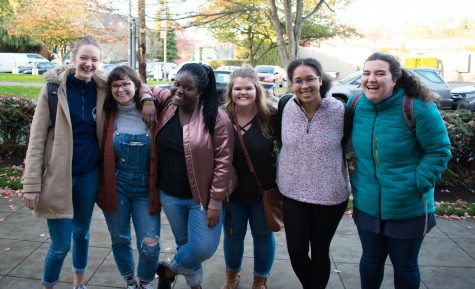Long distance democracy
Examining the challenges SPU students face when voting out of state
November 6, 2019

A group of students share different perceptions on their experience voting in out-of-state elections.
Every year Americans are granted the opportunity to exercise their right to vote. This year, most states and local counties will be hosting elections for state, county and city offices.
With this in mind The Falcon conducted a poll of 100 SPU students who are eligible to vote to figure out how many of them are planning to participate in this year’s elections, as well as which state elections students are participating in. We also asked student voters from various states other than Washington what challenges exist when submitting an absentee ballot from another state.
Kentucky, Louisiana and Mississippi have the most high-level races of the season, as they will be electing governors this year. With only smaller offices up for grabs in other local elections this year, staying up to date on the various races affecting one’s hometown can require much more effort than in years with bigger races.
72% of the 100 eligible voters at SPU said they were planning on voting this November. 58% of those voters were from outside the state of Washington.
22% of voters said they were from California and 12.5% said they were from Oregon. The other 23.5% of students who were polled came from Florida, Colorado, Tennessee, Hawaii, Illinois, New Jersey, Montana, Idaho, Connecticut, Arizona, Texas or Nevada.
When asked about the challenges of voting out of state, every voter from California and Oregon agreed that the voting process was pretty easy, with the only difficulties coming from the mailing process.
“It’s not that annoying, unless they can’t figure out where to send your ballot,” Kat Perez-Smith of California, said.
Voters from other states did not see the process as quite so seamless. Annika Steib of Illinois found the entire process so confusing last year that it prevented her from voting on time.
“It’s really difficult to figure out how to go about doing it,” she said. “Because I wasn’t aware of how to do it in the last election, I couldn’t get it in.”
While the actual process of submitting one’s ballot can be challenging and confusing, voters from SPU living in more distant states found keeping up with issues in their hometown to be just as frustrating.
Johren Carpenter of Montana admitted that it was “hard to stay informed on Montana’s issues.”
“It’s confusing because I know my home state representatives more than Washington but the political climate here will affect how I vote back home,” Matthew Tsutsui of Hawaii said.
Even with the many challenges associated with mailing a ballot and staying updated on issues back home, most students still had a sense of importance around making their voice heard in this year’s elections.
This rang especially true for states with hotly contested races in 2019.
“It’s really important for me to keep my residency since Colorado is a swing state,” Madison Cooper of Colorado said.
While local elections may not have country-wide consequences like congressional and presidential elections, the officials elected this November will still be able to shape local communities on various issues, giving every vote significance.
Gracie Kavanaugh of California explained her outlook on voting by stating that, “It’s really not that exciting, but I feel like I’m contributing to democracy.”



























































































